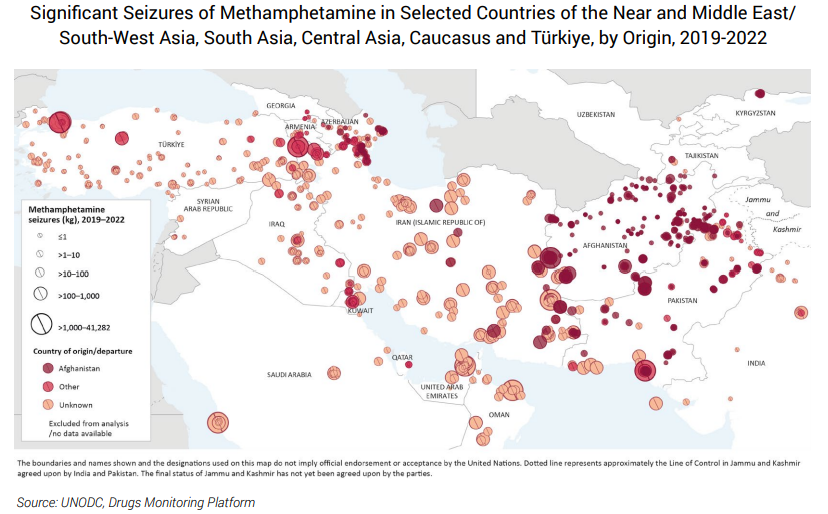Afghanistan now exports large quantities of methamphetamine as well as heroin
According to a UNODC report, the drug trade is “changing illicit drug markets traditionally focused on the trafficking of opiates”. The basic ingredient comes from a plant, ephedra, which grows naturally in the country, but it is much more expensive than chemical precursors legally available. Small-scale Afghan poppy growers are the main losers.
Kabul (AsiaNews/Agencies) – Despite bans on opium production and trade, the Taliban’s methods remain the same.
A report by the United Nations Office on Drugs and Crime Prevention (UNODC) titled Understanding Illegal Metorphamide manufacture in Afghanistan shows that methamphetamine production in Taliban-ruled Afghanistan is the fastest growing in the world.
Over the past five years, seizures of shipments rose almost 12-fold, from 2.5 tonnes in 2017 to 29.7 tonnes in 2021, in the Near and Middle East, Southeast Asia, but also East Africa and the European Union.
Domestically, seizures jumped from under 100 kg per year in 2019 to almost 2,700 kg in 2021, a sign that methamphetamine production is way up.
Despite a drop in production, heroin trafficking has also not halted since Taliban took power again in August 2021, with 6,200 tonnes of opium produced in 2022, UN sources estimate.
In April 2022, Supreme Taliban leader Haibatullah Akhundzada announced the end of the opium trade, but experts note that the ban came into force only a year later, allowing farmers to stock up and maximise profits thanks to higher prices, up from 30,000 Pakistani rupees (US$ 103) per kilo to 520,000 rupees (US$ 1,775) per kilo.
Satellite images suggest a reduction in the area dedicated to poppy cultivation (in some provinces down by 99 per cent), yet the drug trade remains the Taliban’s main source of income.
The main difference is that methamphetamine production is now the mainstay, as its main ingredient, the ephedra plant, grows wild in the country.
According to UNODC report, drug trafficking last year accounted for 14 per cent of Afghanistan's gross domestic product (GDP). Yet, the estimated quantity of drugs smuggled out of the region suggest that the ephedra plant is not enough to manufacture the actual amount of the drug produced.
Production must rely on synthesised chemical inputs, easily available but hard for the authorities to pinpoint.
This means that harvesting ephedra for ephedrine extraction is expensive, which would make methamphetamine unprofitable. Ephedrine can, however, be made synthetically and chemical precursors can be extracted from medical drugs, like flu medications, which enter Afghanistan legally, or can be bought on the black market.
For UN experts, synthetic drugs are a "growing threat" that are "changing illicit drug markets traditionally focused on opioid trafficking".
Small-scale Afghan growers are the main losers, forced to cultivate poppies for the Taliban, who used to provide seeds and fertilisers and interfered with anti-drug activities proposed by the Western coalition (which cost the United States US$ 8.6 billion).
Alternatively, growing wheat or saffron at present is complex and may not cover the costs due to repeated droughts that have hit Afghanistan in recent years.
21/09/2021 15:24
17/03/2005







.png)










